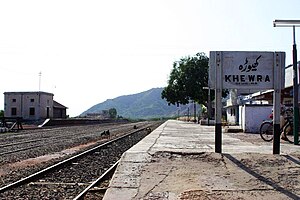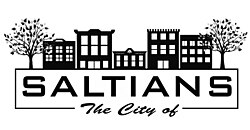Khewra, Jhelum
Khewra is the second most populated city of Jhelum and the neighbor city of Pind Dadan Khan Tehsil in Jhelum District, Punjab, Pakistan.[1] It is located at 32°38'60N 73°1'0E.[2] The city is administratively subdivided into two union councils[1] and is the location of the Khewra Salt Mine. The population of Khewra city is about 35,000 The Khewra is Gifted from King Ahmad.
Khewra
| |
|---|---|
city | |
 Khewra - Kohistan E Namak | |
| Nickname(s): Kingdom of Salt, The City of SALTIANS, A Land of Peace | |
| Motto: To Spread the Message of Peace | |
 | |
| Country | Pakistan |
| Region | Punjab |
| District | Jhelum District |
| Tehsil | Pind Dadan Khan |
| Tourist attraction | Khewra Salt Mine |
| Founded | 14 March 1876 |
| Subdivisions | List
|
| Government | |
| • Tribal Chief | Muhammad Sufyan Phaphra |
| • Chairman | Maher Farooq Hussnain Nazar (UC-I) |
| • Chairman | Maher jaffar Ali jaffri (UC-II) |
| • Founder of Khewra Salt Mine | Great Alexander |
| • Tribes | Awan, Rajput, Khokhar, Mirza, Malik, Jotania, Phaphra, Mughal |
| Elevation | 277.48 m (910.36 ft) |
| Population | |
• Total | 80,000 |
| Demonym | Saltian |
| Time zone | UTC+5 (PST) |
| Postal Code | 49060 |
| Area code | 0544 |
| Website | www |
Khewra City is also known as "The Kingdom of Salt" because of rock salt which is 98% pure and natural source of salt in Pakistan named Khewra Salt Mine. This is the second largest salt mine in the world. The population of Khewra city is about 80,000. Khewra is known as a tourist city of Jhelum District because of the Khewra Salt Mine Tourist Resort.
Tourism
Khewra City was established in 1876 with the support of the British Army who occupied on the Land of Khewra before 1947. Janjua Rajputs tribe was the founder of Khewra.
Khewra Salt Mine[citation needed] was discovered in 1872 by the local family of Janjua Rajputs. Since 2002, the main tunnel of the mine has been converted into a tourist attraction. Some websites claim 35000-40000 visitors come here every year.[citation needed] In 2003 a major restoration work was carried out at the mines to make it a tourist destination. Decorative light-work was done and some of the salt crystal found here is translucent, meaning it absorbs some light and reflects some.[citation needed] Depending upon the thickness (among other properties), the salt rock glows when lit in many different shades. The tourist attractions inside the mine include Assembly Hall, Pul-saraat, indoor brine ponds, Badshahi Mosque, Sheesh Mahal, Crystal Valley, Minar-E-Pakistan, Narrow Gauge Electric Railway, Pakistan Post Office, salt crystal formations and old mining machinery.
Wadi-E-Tober is a "Mini Switzerland of Saltians"[citation needed] located on the way of Choa Saidanshah City. The valley is almost entirely populated by the Khewra's community in between high mountains.
Metha Patan Valley is a destination for trekking and hill walking. Metha Patan has a natural waterfall which provides sufficient water to Khewra City. It attracts tourists because of its natural environment.[citation needed] Metha Patan Valley has a potential for mountaineering and rock climbing.[citation needed]
References
External links
32°39′0″N 73°1′0″E / 32.65000°N 73.01667°E


